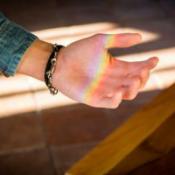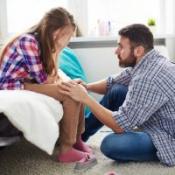 Despite some recent legal changes to protect the civil rights of LGBTQ+ people in some states, we continue to be the most common targets of hate crimes in the U.S. (Park and Mykhyalyshyn, 2016). No such crime has resonated in the public consciousness like the one that took place in the early hours of June 12, 2016 at a gay nightclub in Orlando, Florida, where 49 people were killed and 50 others injured by a lone gunman in “the deadliest attack on the LGBT community in U.S. history” (Ravitz, 2016).
Despite some recent legal changes to protect the civil rights of LGBTQ+ people in some states, we continue to be the most common targets of hate crimes in the U.S. (Park and Mykhyalyshyn, 2016). No such crime has resonated in the public consciousness like the one that took place in the early hours of June 12, 2016 at a gay nightclub in Orlando, Florida, where 49 people were killed and 50 others injured by a lone gunman in “the deadliest attack on the LGBT community in U.S. history” (Ravitz, 2016).
The incident created a ripple effect of grief, fear, anger, and unity among those directly and indirectly affected by it. Through the bonds of shared trials and tribulations that come with being a marginalized group, the LGBTQ+ community provides vital safety and connection—a “family of choice,” if you will—for those who may not be accepted even within their families of origin. Because this connection is so deeply rooted, it only makes sense that the Orlando tragedy devastated and traumatized the whole of our community.
Research has demonstrated that acts of terrorism erode “the sense of security and safety people usually feel” (Hamblen and Sloane, 2016). But what about people who weren’t accustomed to feeling safety and security in the first place? Even those of us in the LGBTQ+ community who have been able to legally marry our partners face conscious and unconscious threats and concerns on a daily basis: disclosing LGBTQ+ identity to coworkers/employers, choosing certain clothing options to avoid detection of our identity, researching how our community is treated in a given location before planning a trip, making split-second calculations as to whether it is safe to show even minimal forms of public affection. It is our complex set of collective experiences that places us at risk for having our previous experiences of aggression and microaggression triggered by an act of violence like the one in Orlando.
Guarding Against Secondary Trauma
Those of us in the helping professions have been trained to guard ourselves against vicarious trauma. This type of secondary trauma is the “emotional residue of exposure that counselors have from working with people as they are hearing their trauma stories and become witnesses to the pain, fear, and terror that trauma survivors have endured” (American Counseling Association, 2011). However, secondary trauma is a concern for anyone, not just mental health professionals. According to a 2015 study, individuals viewing traumatic events through various forms of media are susceptible to trauma-related symptoms despite having no direct connection or experience of the traumatic event (British Psychological Society, 2015).
So what can we do to cope in the aftermath of Orlando? First, it’s a good idea to check in with loved ones and ourselves and notice if there have been changes to daily routines (such as eating and sleeping) and functioning (concentration, racing thoughts or worries, increased startle responses, etc.). If there have been changes, the U.S. Department of Veterans Affairs (2015) recommends the following self-care approaches:
- Be gentle with yourself: Know that negative responses following exposure to traumatic events are normal and these symptoms often fade.
- Try to relax: Meditation, practicing mindfulness, listening to music, reading, spending time outdoors, spending time with pets, and exercising are just a few ways to unwind.
- Get some support: Lean on family and friends for emotional support. It may be a good time to locate a therapist as an additional resource.
- Know that some activities won’t help: Avoid turning to substances, reacting with violence, or pretending you aren’t struggling.
- Limit exposure to various forms of media: Don’t glue yourself to the television or internet where you’re likely to see coverage of the event. Consider limiting yourself to reading about updates for a specific amount of time once per day (British Psychological Society, 2015).
We can also borrow from the tips given to professional helpers to transform trauma into something positive. The Headington Institute, specializing in helping humanitarian workers cope with the traumas they witness, has several tips for achieving this transformation (Ashimoto, 2014):
- Deepen your humanity: Take stock of the collection of positive and negative experiences you see around you and try to engage with empathy. Share the resulting thoughts and observations with someone you trust as a means of gaining greater insight into your own process and, in turn, deepening your relationship with that person.
- Increase your spiritual vitality: While this may mean visiting your chosen place of worship, it can also mean reconnecting with your own “spirit,” in whatever form that might take. You may want to try listening to music, getting out into nature, and practicing being present in your environment by focusing on how your senses experience your surroundings.
- Examine your beliefs: Learn how to challenge negative thoughts with evidence that contradicts those thoughts. An example specific to this tragedy would be focusing on the positive ways it has brought together the LGBTQ+ community and our allies.
As a therapist and a member of the LGBTQ+ community, I challenge my “family of choice” and our allies to transform this trauma, even as we mourn.
References:
- American Counseling Association. (2011). Fact Sheet #9: Vicarious Trauma. Retrieved from http://www.counseling.org/docs/trauma-disaster/fact-sheet-9—vicarious-pdf?sfvrsn=2
- Ashimoto, F. (2014, October, 6). Transforming vicarious trauma [Video file]. Retrieved from http://www.headington-institute.org/blog-home/433/transforming-vicarious-trauma
- British Psychological Society. (2015, May 6). Viewing violent news on social media can cause trauma. ScienceDaily. Retrieved from http://www.sciencedaily.com/releases/2015/05/150506164240.htm
- Hamblen, J., & Sloane, L. (2016, February, 23). Research findings on the traumatic stress effects of terrorism. Retrieved from http://www.ptsd.va.gov/professional/trauma/disaster-terrorism/research-findings-traumatic-stress-terrorism.asp
- Park, H., & Mykhyalyshyn, I. (2016, June, 16). G.B.T. people are more likely to be targets of hate crimes than any other group. Retrieved from http://www.nytimes.com/interactive/2016/06/16/us/hate-crimes-against-lgbt.html?_r=1
- Ravitz, J. (2016, June, 17). Before Orlando: the (former) deadliest LGBT attack in US history. Retrieved from http://www.cnn.com/2016/06/16/health/1973-new-orleans-gay-bar-arson-attack/
- U.S. Department of Veterans Affairs. (2015, August, 14). Coping with traumatic stress reactions. Retrieved from http://www.ptsd.va.gov/public/treatment/cope/coping-traumatic-stress.asp

The preceding article was solely written by the author named above. Any views and opinions expressed are not necessarily shared by GoodTherapy.org. Questions or concerns about the preceding article can be directed to the author or posted as a comment below.

 What My Gay Son Taught Me About the Orlando Massacre
What My Gay Son Taught Me About the Orlando Massacre How to Help an LGBT Teen Cope with the Orlando Massacre
How to Help an LGBT Teen Cope with the Orlando Massacre How Bathroom Discrimination Puts Trans People at Risk
How Bathroom Discrimination Puts Trans People at Risk

